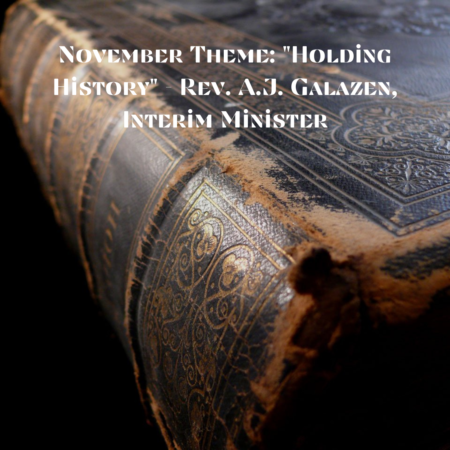“re•gret (r-grt) 1. (Verb) To remember with a sense of sadness: Her son, a soldier, always said it is better to regret something you did than something you didn’t do. And there were nights when she would regret in the form of a list—regret not uttering I love you enough, regret not having been able to stay up into the blue hours to help with his homework, regret having watched his ship sail off without having once declared what she really believed…”
— From the poem “Regret” by Matthew Olzmann
The transition between last month’s theme, “Cultivating Relationship,” and this month’s, “Holding History” became very fluid to me as we celebrated All Souls Sunday, a tribute to the dear ones we have lost. One of the things I preached from the pulpit was that I didn’t believe that relationships end at the time of death. Relationships end when we forget.
As part of my “homework” for All Souls, I visited some of the cemeteries in Denton. On a very windy morning, I walked among the stones at Roselawn, a lovely setting of gentle gardens and mature trees. Each marker is proof of some relationship, and I was pleasantly surprised by the variety of epitaphs and creative carvings I found.
Some cemeteries have strict rules about what is and what is not appropriate. At Roselawn, I was glad to find images of whimsy and play, such as a plane with a spinning propeller above a grave, and a tombstone in the shape of a football, for a fallen linebacker. They say “A picture is worth a thousand words,” and on one granite marker for a married couple, there were two pictures: a Union Pacific locomotive on one side, and a stack of books with an apple on the other side. Can you imagine dinnertime conversation between them?
Matthew Olzmann’s poem gives examples when memory can be the source of regret. As we move into the theme of “history” we might be prepared for some bittersweet challenges, both in the stories that came before us, events that we are the beneficiaries of, and in the stories that find fault closer to home, when we didn’t do as much as we could have. There will be some painful moments in our stories, and for me, that makes them real.
My reverie at Roselawn was punctuated by a most welcome guest: the tinkling sound of a multitude of windchimes. Whether this was planned by the cemetery owners, or simply a folk tradition that hit the right chord, it made me very happy. I have often considered gentle music to be evidence of angels. I sat on a stone bench, waiting for a messenger from the past to speak through the bells.
“Ah,” said the wind, “you don’t get off that easy. History is re-written as a symphony of errors. Now is the time to do the work of grief, confession, and forgiveness.”

